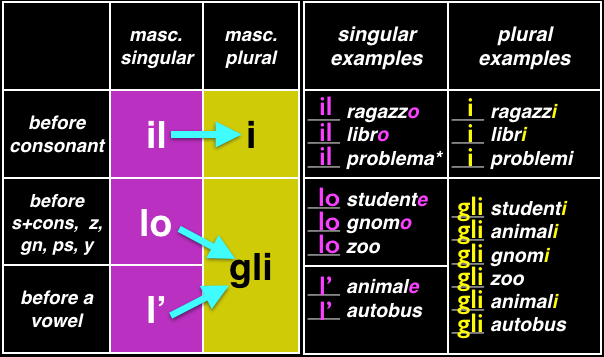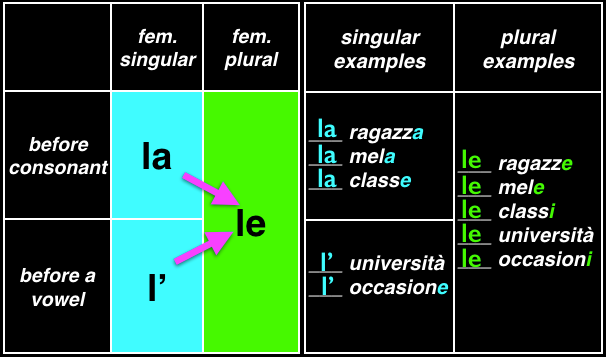Italian Nouns: Definite Articles
- The Gender of Italian Nouns: Masculine & Feminine
- Italian Nouns: Singular and Plural
- Definite Articles
- Indefinite Articles
Italian Definite Articles
After learning about singular and plural nouns in Italian, the next step is to learn definite articles. Articles are the small words that go in front of nouns, and there are two types: definite and indefinite. Definite articles (the English - the) are the subject of this page. If you'd like to learn about indefinite articles (the English - a or an) follow this link.
Italian Nouns: Definite Articles:
Watch the following video to learn the rules for using definite articles in Italian:
*There are exercises at the end of the video to reinforce what you have learned.
There are 8 different definite articles in Italian: 5 used with masculine nouns and 3 for feminine nouns.
Here is a chart of the masculine definite articles in Italian:

In addition a noun's gender, the article that you put in front of the noun is determined by the first letter(s) of the word. If a word is masculine singular and starts with a consonant the article will be il as in il ragazzo. Il becomes plural by changing to i, as in i ragazzi. If a word is masculine singular and starts with a vowel the article will be l', as in l'animale. The article lo goes in front of masculine singular words that start with s + a consonant, z, gn, ps, pn, and y. Both l' and lo share the same plural form, gli -- in such a way that both lo studente and l'animale become gli studenti and gli animali in the plural.
*Note that problema is masculine despite its typically feminine ending. Words derived from Greek that end in -ma, like emblema, programma, and dramma look feminine, but are actually masculine.
Here is a chart of the feminine definite articles in Italian:

If a noun is feminine singular and starts with a consonant the article will be la as in la ragazza. Before a feminine noun that starts with a vowel, l' is used as in l'università. Both la and l' become le in the plural, thus le ragazze and le università*.
*-à is a common feminine ending for nouns in Italian. Other examples are città and libertà it doesn't change in the singular or plural. The article is essential in cases of invariable nouns to determine whether the word is singular or plural.